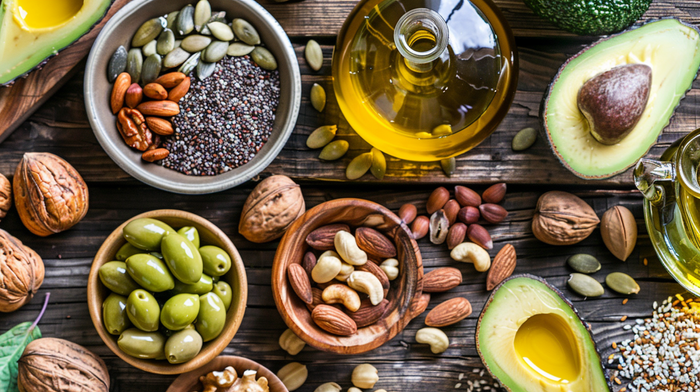Healthy fats - why are they important in the diet?

For a long time, fats were wrongly demonized, and their consumption was linked to many health problems. However, a growing body of scientific research indicates that healthy fats are an essential component of a balanced diet. They play a key role in many vital functions, including proper brain function, vitamin absorption, and may also contribute to maintaining a healthy weight. In this article, we'll take a closer look at why healthy fats are so important for our bodies and what sources of fats are worth including in your diet.
The role of fats in the body
Fats are one of the three main macronutrients, along with proteins and carbohydrates, and have many important functions in the body. They are a source of energy, a component of cell membranes, help in the production of certain hormones, and are essential for the absorption of fat-soluble vitamins such as A, D, E and K. In addition, healthy fats can help lower levels of bad cholesterol (LDL) while increasing levels of good cholesterol (HDL), which is key to preventing heart disease.
Types of healthy fats
There are several types of fats that are beneficial to health: unsaturated monounsaturated and polyunsaturated fats, as well as omega-3 and omega-6 fats. Sources of monounsaturated fats are primarily olive oil, avocados, nuts such as almonds, hazelnuts and macadamia nuts. Polyunsaturated fats, on the other hand, can be found in fish such as salmon, mackerel and sardines, as well as vegetable oils, seeds and nuts. Particularly valuable for health are omega-3 fatty acids, which play a key role in brain function and can help lower the risk of heart disease.
How do you incorporate healthy fats into your diet?
Incorporating healthy fats into your diet doesn't have to be difficult. You can start with simple changes, such as using olive oil as the main fat for cooking and salads. It's also a good idea to regularly eat fish rich in omega-3 fatty acids, such as salmon and sardines, at least twice a week. Nuts, seeds and avocados are great additions to salads, yogurts or as snacks. It is also important to pay attention to product labels and choose those that do not contain trans fats, which are considered harmful to health.
Potential health benefits
Regular consumption of healthy fats can provide many health benefits. In addition to the aforementioned effects on cholesterol levels and heart health, healthy fats can also support brain function, improve skin condition and even contribute to weight loss. Fats are more filling than carbohydrates, which can help control appetite and avoid snacking between meals. In addition, healthy fats provide the body with essential fatty acids, which are important for many metabolic processes.
Summary
Healthy fats are an essential component of a balanced diet and are crucial for many of our body's functions. When choosing sources of fats, it makes sense to focus on unsaturated ones, such as olive oil, fish, nuts and avocados. Incorporating healthy fats into your diet on a regular basis can provide a host of health benefits, from improving heart health to helping you maintain a healthy weight. Remember that, as in any balanced diet, moderation and variety are key.




